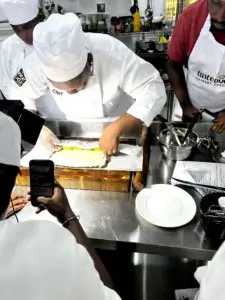What Does “Certified Chef” Mean in Nigeria?
Certification in Nigeria typically means you’ve completed a formal culinary training program recognized by educational or industry bodies. These certifications—offered by institutions like the National Institute for Hospitality and Tourism (NIHOTOUR) or private culinary schools—demonstrate your competency in food preparation, hygiene, and kitchen operations.
In some cases, certification also includes international qualifications, such as City & Guilds diplomas, opening doors to global opportunities.
Step 1: Develop Basic Cooking Skills
Before diving into formal training, it’s important to have a working knowledge of:
- Basic knife skills
- Cooking methods (boiling, sautéing, grilling, etc.)
- Ingredient handling and food safety
- Local food culture and dishes
You can gain these skills through:
- Home practice
- Informal mentorship with a local chef
- Entry-level work in restaurants or hotels
Step 2: Enroll in a Recognized Culinary School
To earn certification, you’ll need formal training. Nigeria has several institutions offering professional chef programs.
Top Culinary Schools in Nigeria:
- Tastebudz Culinary Academy – Lagos
- Red Dish Chronicles – Abuja, Lagos
- Chef Academy Nigeria – Lagos
- Wavecrest College of Hospitality – Lagos
- NIHOTOUR – Nationwide
- Culinary Academy Nigeria – Lagos
What You’ll Learn:
- Culinary techniques and kitchen fundamentals
- Pastry and baking
- Nutrition and food science
- Hygiene and sanitation
- International cuisine and plating skills
Typical Program Length & Cost:
- Duration: 3 months to 2 years
- Cost: ₦200,000 – ₦2,000,000+, depending on institution and level
Step 3: Earn a Recognized Certification
Upon completing your training, most schools issue a certificate of completion. For broader recognition, pursue certifications such as:
- National Vocational Certificate (NVC) from NBTE
- City & Guilds International Culinary Certification
- Diploma in Hospitality or Culinary Arts
These credentials improve your job prospects and are often required by hotels, resorts, and restaurants in Nigeria and abroad.
Step 4: Gain Real-World Experience
Certification is a milestone—but experience refines your craft.
Ways to build experience:
- Work in hotel or restaurant kitchens
- Join catering teams
- Intern at food production companies
- Volunteer for food events or pop-ups
“I started with street food in Jos,” says Fatima Idris, now a certified chef working in a Lagos hotel. “Culinary school gave me technique—but working every day gave me rhythm.”
Over time, you may choose to specialize in:
- Nigerian regional cuisines
- Continental and fine dining
- Baking and pastry
- Event catering
- Culinary education
Optional: Consider International Pathways
If you’re looking to work abroad or gain global credentials, some Nigerian culinary schools offer partnerships with:
- City & Guilds (UK)
- American Culinary Federation (USA)
- Le Cordon Bleu (via exchange programs)
These often require additional exams or internships but can expand your opportunities worldwide.
Summary: Your Path to Certification
| Step | Description |
|---|---|
| 1 | Build basic cooking skills |
| 2 | Enroll in a certified culinary school |
| 3 | Complete a professional program |
| 4 | Earn national or international certification |
| 5 | Gain experience and specialize |
Useful Resources




2 comments
Cynthia Gift Igberase
Hi my name is Cynthia and I’m interested
Mercy
Hi my name is Mercy and I’m interested in enrolling in this academy in other to acquire this certificate.but I’m a widow with three kids still managing to train them pls how can I pay bit by bit pls